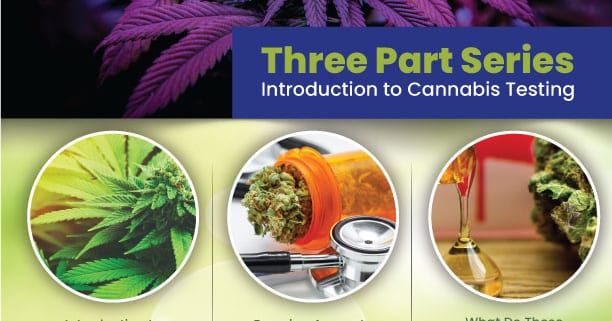The Purpose of Testing
An important step in ensuring safety for Missouri medical marijuana consumers is to confirm marijuana products meet specific safety thresholds through accurate laboratory testing. Additionally, accurately testing marijuana products for potency ensures labels have the appropriate information regarding their strength which helps industry experts determine dosage.
Commonly Asked Questions
What Do Missouri Testing Labs Test for?
Laboratory testing regulations for Missouri marijuana have been determined by Missouri State Law outlined in CSR Article 19.
While some industry experts understand what is expected to be tested, testing requirements and specifications are very state specific. And although state testing regulations are similar state-to-state, it is important to understand what tests are Missouri state mandated versus what services are A la Carte. Missouri requires the following to be tested:
What Specific Microbials Do You Test For?
Missouri Required:
Mycotoxins including Aflatoxins and Ochratoxin A
Pathogenic Aspergillus Species
Pathogenic E. Coli
Salmonella
Additional Mold Tests MoCann Testing Offers:
Total Yeast and Mold
Powdery Mildew
Additional Services Upon Request
Microbials
Microbial contamination on cannabis products represents one of the most significant threats to cannabis consumers, particularly immunocompromised patients who could develop harmful infections.
Mycotoxins
Mycotoxins are highly toxic chemical byproducts from fungi commonly found in crops. As very small quantities are capable of causing disease state and/or death, the control of mycotoxins is a critical testing requirement of cannabis testing. MoCann Testing has validated test methods to analyze for aflatoxins and ochratoxin A (others available upon request) at or below the 20 ppb (parts per billion) Missouri limits.
Aspergillus
Aspergillus is a Saprophytic fungus that helps (https://www.ncbi.nlm.nih.gov/pmc/articles/PMC88920/) remove environmental carbon and nitrogen and is commonly found in soil, but its spores propagate rapidly in the air with each fungus capable of producing thousands of conidia.
While there are several hundred different species of Aspergillus, and not all are dangerous to humans, any detection of Aspergillus in the sample is a failure as outline by Missouri law makers.
 Positive Detection of Aspergillus (rise in blue signal)
Positive Detection of Aspergillus (rise in blue signal)
 Negative Aspergillus (no rise in blue signal)
Negative Aspergillus (no rise in blue signal)
Note: Rise in green signal indicates the cannabis sample DNA was replicated appropriately
E. Coli.
E.coli is a type of coliform bacteria commonly found in the lower intestine of warm-blooded organisms. Most E.coli strains are harmless, but others can cause food poisoning when ingested by humans. Most states require cannabis samples be tested for E.coli.
E.coli is a presence/absence test, which means any detection of E.coli in the sample is a failure.
Salmonella
Salmonella is a member of the Enterobacteriaceae family, is estimated to cause 1.2 million foodborne illnesses and 450 deaths each year.
Salmonella testing on cannabis is a presence/absence test, which means any detection of Salmonella in the sample will result in a failure.
 Positive Detection of Salmonella and E. Coli (rise in blue and orange signals)
Positive Detection of Salmonella and E. Coli (rise in blue and orange signals)
 Negative Salmonella and E. Coli (no rise in blue and orange signals)
Negative Salmonella and E. Coli (no rise in blue and orange signals)
Note: Rise in green signal indicates the cannabis sample DNA was replicated appropriately
The results of a Total Yeast and Mold (TYM) test are an indication of yeast and mold contamination on a cannabis sample.
Yeasts and molds can cause deterioration and decomposition. Certain species of yeast and mold produce toxins that can cause potentially fatal infections.
While a high TYM result doesn’t necessarily mean a sample is harmful to consumers due to some beneficial microbes that could exists on the cannabis plant, many other states require cannabis samples to pass TYM testing before patients have access to the product. However, acceptance levels for each state range drastically from 10 Colony Forming Units (CFU)/g to 100,000 CFU/g. As this is not a Missouri state required test, there is no “failure” limit. That said, it is important for cultivators and manufacturers that submit their products for this testing to understand and evaluate their internal acceptance level to ensure the safety for patients. MoCann Testing recommends less than 10,000 CFU/g on cannabis plant and less than 1,000 CFU/g on extracts.
Powdery Mildew
Powdery Mildew (PM) is arguable the most destructive Cannabis pest. It is an obligate biotroph that can vascularize into the plant tissue and remain invisible to a grower. It tends to emerge and sporulate two weeks into flowering thus destroying very mature crop with severe economic consequences. It is believed to travel in clones and it is not known if it travels in seeds. Other stressful events like cloning can trigger PM spore formation. Early detection and eradication may be the safest approach.
About MoCann Testing
MoCann Testing, based in St. Louis, Missouri, is the FIRST Missouri state certified, ISO 17025 compliant marijuana testing laboratory. As a division of EKG Labs, a pharmaceutical and medical device analytical laboratory, our clients can be confident that the results are accurate and reported in a manner compliant with all of the state’s requirements.
To find out more about microbials testing, contact MoCann Testing at Tel: 810-354-5229, or via our website.







 Positive Detection of Aspergillus (rise in blue signal)
Positive Detection of Aspergillus (rise in blue signal) Negative Aspergillus (no rise in blue signal)
Negative Aspergillus (no rise in blue signal) Positive Detection of Salmonella and E. Coli (rise in blue and orange signals)
Positive Detection of Salmonella and E. Coli (rise in blue and orange signals) Negative Salmonella and E. Coli (no rise in blue and orange signals)
Negative Salmonella and E. Coli (no rise in blue and orange signals)